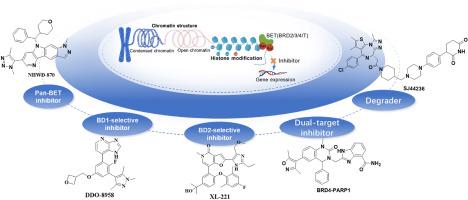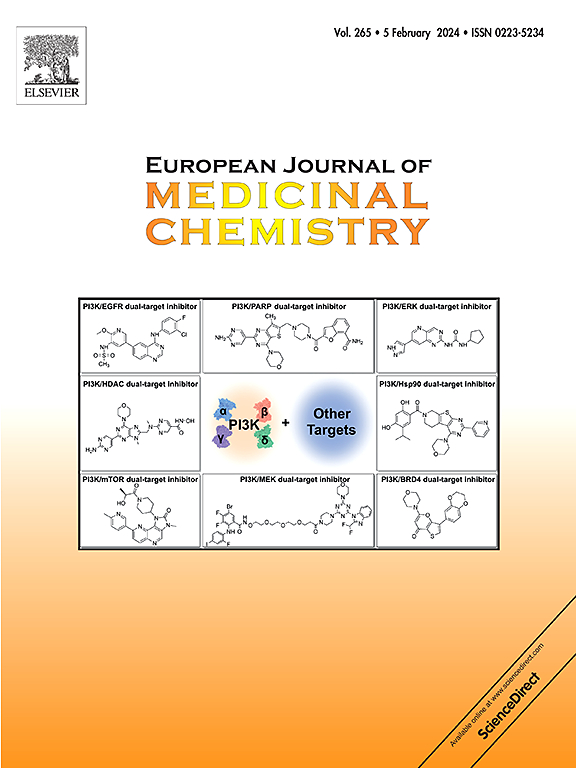Recent Advances and Strategies in BET Bromodomain Inhibition for Drug Discovery
IF 5.9
2区 医学
Q1 CHEMISTRY, MEDICINAL
引用次数: 0
Abstract
BET proteins, which function as epigenetic readers to modulate gene expression and drive cancer progression, have emerged as promising targets for novel epigenetic anticancer therapies. Although preclinical models and initial clinical trials have demonstrated the anticancer potential of BET inhibitors, Pan-BET inhibitors often exhibit unsatisfied tolerability, dose-limiting toxicities, and limited efficacy as monotherapies. Recent studies highlight that selective BET inhibitors targeting individual bromodomains (BET-BD1 or BET-BD2) offer distinct advantages over pan-inhibitors, including reduced toxicity profiles. Notably, certain selective BET inhibitors demonstrate comparable or superior therapeutic efficacy in treating inflammatory diseases and cancers compared to pan-inhibitors. Consequently, the development of domain-selective BET inhibitors has become a focal point in medicinal chemistry research. This review summarizes the structural and functional characteristics of BET proteins, elucidates the differential binding preferences and biological roles of BD1 and BD2 domains, and systematically outlines recent advancements over the past five years in BD1- and BD2-selective BET inhibitors. Furthermore, it provides a detailed overview of dual-target inhibitors and degraders. Finally, perspectives on future research directions for BET-targeted therapeutics are discussed.

BET溴域抑制药物开发的最新进展与策略
BET蛋白作为表观遗传读取器调节基因表达并驱动癌症进展,已成为新型表观遗传抗癌治疗的有希望的靶点。虽然临床前模型和初步临床试验已经证明了BET抑制剂的抗癌潜力,但Pan-BET抑制剂通常表现出不满意的耐受性,剂量限制性毒性和单一疗法的有限疗效。最近的研究强调,靶向单个溴域(BET- bd1或BET- bd2)的选择性BET抑制剂比泛抑制剂具有明显的优势,包括降低毒性。值得注意的是,与泛抑制剂相比,某些选择性BET抑制剂在治疗炎症性疾病和癌症方面表现出相当或更好的治疗效果。因此,结构域选择性BET抑制剂的开发已成为药物化学研究的热点。本文综述了BET蛋白的结构和功能特征,阐明了BD1和BD2结构域的不同结合偏好和生物学作用,并系统概述了近五年来BD1和BD2选择性BET抑制剂的最新进展。此外,它还提供了双靶点抑制剂和降解剂的详细概述。最后,对未来bett靶向治疗的研究方向进行了展望。
本文章由计算机程序翻译,如有差异,请以英文原文为准。
求助全文
约1分钟内获得全文
求助全文
来源期刊
CiteScore
11.70
自引率
9.00%
发文量
863
审稿时长
29 days
期刊介绍:
The European Journal of Medicinal Chemistry is a global journal that publishes studies on all aspects of medicinal chemistry. It provides a medium for publication of original papers and also welcomes critical review papers.
A typical paper would report on the organic synthesis, characterization and pharmacological evaluation of compounds. Other topics of interest are drug design, QSAR, molecular modeling, drug-receptor interactions, molecular aspects of drug metabolism, prodrug synthesis and drug targeting. The journal expects manuscripts to present the rational for a study, provide insight into the design of compounds or understanding of mechanism, or clarify the targets.

 求助内容:
求助内容: 应助结果提醒方式:
应助结果提醒方式:


